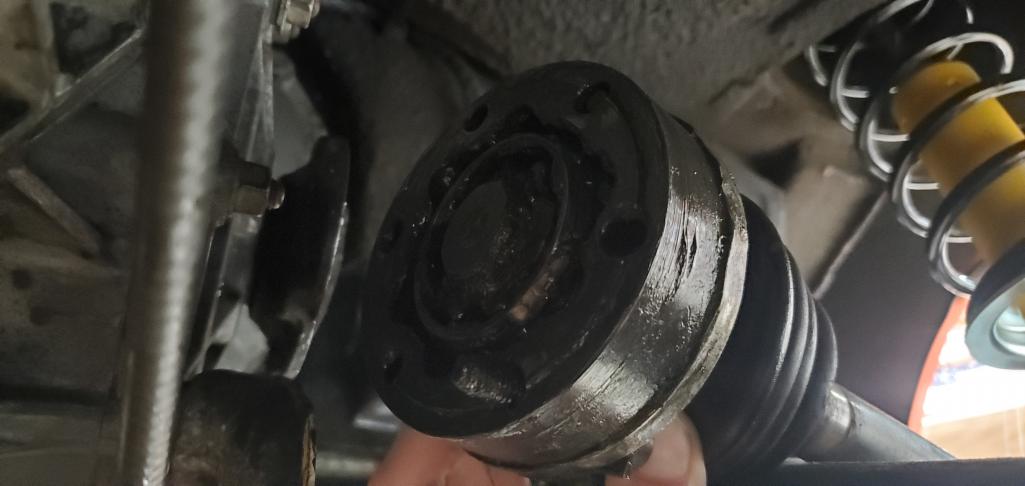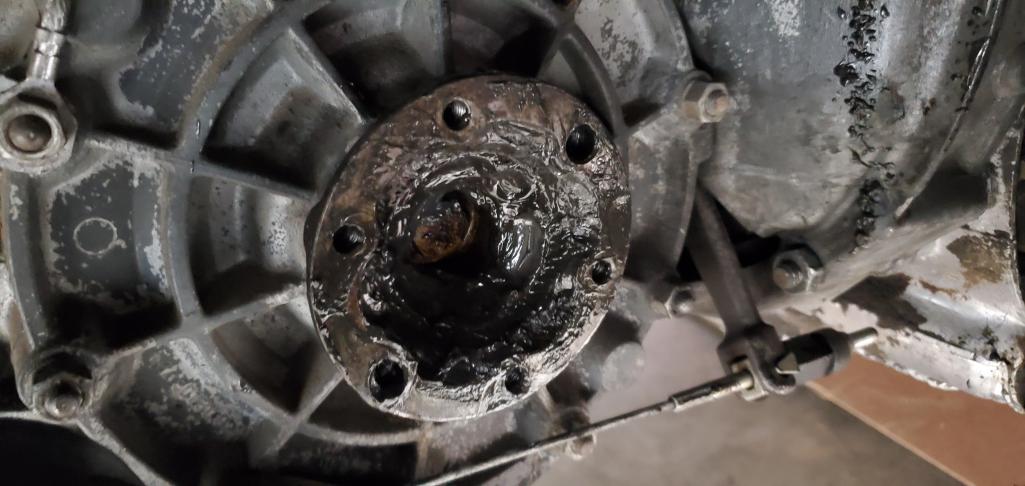Printable Version of Topic
Click here to view this topic in its original format
914World.com _ 914World Garage _ Axle bolts and Pins
Posted by: tvdinnerbythepool Aug 7 2020, 07:56 AM
Axle fell of the transmission yesterday. Bent a bolt and sheared a bolt. The other two appear to be fine and just loosened themselves out.
My assumption is I didn't torque them down correctly.
Question is.....
Bolt size? I have M8 special bit
And...
There are 6 holes....4 bolts and 2 alignment pins correct?
I appear to have lost those 2 pins when the axle came off.
Source for the 2 pins?
Thanks all!
-R
Posted by: GregAmy Aug 7 2020, 08:28 AM
There's four bolts each axle, two drive pins.
M8x45 with a triple-square head. Drilled for safety wire: https://914rubber.com/cv-joint-bolt-m8-x-45-1-1
Also sells the Schorr washers: https://914rubber.com/schnorr-washer-for-8mm-1
And CV gaskets: https://914rubber.com/cv-joint-gasket-1-1
It's possible they were not torqued correctly, but just as likely that the threads were not cleaned out well. Ever since I started dealing with CV joints like these (started with the Rabbits in the early 80s) I've had some bolts back out (rare, but it has happened). Ever since then I clean the threads religiously, use Loctite Blue and new Schorr washers, and torque properly.
Ever since 914Rubber started selling the ones with holes drilled, I've used safety wire instead.
Maybe that's overly-zealous, but it helps me sleep better at night... ![]()
Posted by: Tbrown4x4 Aug 7 2020, 08:46 AM
I should have what you need Rob. Let me do a little digging around, and I'll PM you
Posted by: Superhawk996 Aug 7 2020, 09:13 AM
Not an attempt to kick you while you're down. I'm sorry this happend to you.
1) Use a torque wrench - it really is a must have. Over time you'll actually find you need several ranges and/or styles depending on the job.
2) Check all your 12 point fasteners. If the heads are stripped or worn, replace them. Hard to get proper torque if the head is buggered.
3) Use the proper 12 point tool in the internet age they are easy to come by.
4) Use new Schnorr washers - don't resuse the old ones.
5) Clean all that grease up, especially out of the hub threads. Use brake cleaner. As stated previouly having grease in the threads lowers coefficient of friction and helps enable loss of torque and grease in the threads will negate any Locktite application.
6) A drop or two of blue locktite upon reassembly. Contrary to popular belief, more isn't better and just results in wasted threadlocker and extended cure times.
7) Torque to spec with torque wrench and proper 12 point tool.
Proper torque is the most important of all these steps. Guessing or going by feel simply doesn't work.
Posted by: bdstone914 Aug 7 2020, 09:17 AM
All good advise. Another tip is put a drop of paint on the base of the head on each bolt and on the flange. Inspect occasionally. If the punt marks do not align they are backing off.
Posted by: Superhawk996 Aug 7 2020, 09:25 AM
All good advise. Another tip is put a drop of paint on the base of the head on each bolt and on the flange. Inspect occasionally. If the punt marks do not align they are backing off.
Posted by: tvdinnerbythepool Aug 7 2020, 09:51 AM
As always, thanks to all of you.
Todd has got some pins and parts coming my way and I am placing an order through 914 rubber for the new bolts with wire.
This happened a block from my house fortunately and not on the 914 cruise last weekend!
Gonna do the Speedo drive kit from Mark while i'm under there.
Cheers
-Rob
Posted by: Superhawk996 Aug 7 2020, 11:00 AM
As always, thanks to all of you.
. . . I am placing an order through 914 rubber for the new bolts with wire.
Don't take this the wrong way if you're already aware of the implications.
Safety wire is no substitue for proper torque. I've seen safety wire fail in race applications. Double that if the safety wire wasn't installed properly in the 1st place. If not already familar with how to safety wire properly, Google and/or Carrol Smith books will teach you.
Millions upon millions of OEM vehicles with CV joints ship yearly, worldwide, without safety wire. They run hundres of thousands of miles without a CV joint ever loosening up.
As an Ex-racer myself, I understand why safety wire is done in racing. As an Automotive Engineer I also know that it isn't necessary if the fasteners are properly torqued.
Posted by: rhodyguy Aug 7 2020, 02:10 PM
Not so sure the outer hub recesses are supposed to be packed with grease. McMaster/Carr is the place to buy the Schnor washers. Also known as 'Belleville'. Spelling might be off. Buy a 100 pack. They work well for the intakes on carbed cars rather than cut washers
Posted by: PanelBilly Aug 7 2020, 02:37 PM
If you didn’t already order the bolts, I’m pretty sure I have a new set and the shore washers too
Posted by: PanelBilly Aug 7 2020, 02:53 PM
I looked and only found M10
Posted by: ClayPerrine Aug 7 2020, 06:00 PM
100% agree with using the torque wrench. At one time I was poor, and didn't replace the schnorr washers plus I didn't use a torque wrench. Ended up losing the CV joint and bending the shift rod.
ALWAYS replace the schnorr washers and CV gaskets. Use the proper tool and a torque wrench to torque the bolts to 31 lb/ft. And every time you get under the car, visually check all 8 bolts.
Posted by: porschetub Aug 7 2020, 06:39 PM
Make sure you check the threads on the broken and bent bolt area's on the output flange,it takes a lot to bend and snap these HT capscrews...just saying.
I torque to 31 ft/pounds and never has an issue,these bolts can handle that,this torgue is what I used on all the watercooled VW Golfs and never a failure as mentioned by greg and clay.
Again as mentioned the matting faces and bolts need to be spotless,nothing wrong with a wee lick of Loctite...end of story.
Posted by: IronHillRestorations Aug 8 2020, 05:10 AM
I don’t know if it makes a difference but I like to put the bolts in without the washers, pull the CV/gasket/flange assembly together, take off the bolts one at a time and put a new Schnorr washer on each bolt and torque to spec (31 ft lbs IIRC)
Posted by: Superhawk996 Aug 8 2020, 09:18 AM
Also known as 'Belleville'. Spelling might be off. Buy a 100 pack. They work well for the intakes on carbed cars rather than cut washers
Long side note:
Schnorr washers are a type of Belleville washer (disc spring washer - or conical spring washer). However, Generic Belleville (plain or serrated) washers are not Schnorr washers.
Schnorr washers have a slightly different trapezoidal gear tooth pattern pressed into them that has a lower coefficient of friction when tighetening and a higer coefficient of friction in the loosening direction once the disc spring is under pre-load when the fastener is tightened.
Schnorr also has specific washer type "VS" for use with grade 12.9 fasteners like the tri-square 12 point CV Joint fasteners.
Honestly I don't know for sure if VW/Porsche originally used the VS grade Schnorr washers. I would suspect that they were sourced and specified to work with the OEM fastners even if they weren't referred to as VS seiries back then.
https://www.schnorr-group.com/en/products/safety-washers/
I'm sure a generic Bellville washer is beter than a 50 year old Schnorr that is worn out from multiple reuses.
In the end the fastener isn't retained by any sort of washer. A fastener is retained in place by clamp load that results from being tightened properly and developing a strech in the fastner that works like a very high rate spring.
When used in OEM method - single washer under the bolt head. The spring rate of the fastener shank is far higher than the spring rate of the Schnorr or Belleville washer. The waser compresses first, then the bolt shank stretches and establishes clamp load.
So what does the Schnorr washer do differently?
The design of the Schnorr washer helps provide some resistance to the fastener losing clamp load due to vibration acting to loosen the fastener. The Schnorr teeth "bite" into the base metal and the higer coefficient of friction in the counter clockwise direction helps prevent the fastern from loosening counter clockwise.
Beyond that, I'd areee that a Schnorr acts just like a Belleville washer.
In the end, neither will make up for not properly tightening the fastener using a torque wrench.
Posted by: Superhawk996 Aug 8 2020, 09:35 AM
They work well for the intakes on carbed cars rather than cut washers
Split ring lock washer are worse than useless because they have been know to break and fall out from under the bolt head, leading to a complete loss of clamp load. They perform no useful function. Split ring lock washers have no legitimate use in automotive applications.
Excerpt from NASA fastener manual
Lockwashers
"The typical helical spring washer shown in figure 14 is made
of slightly trapezoidal wire formed into a helix of one coil so
that the free height is approximately twice the thickness of the
washer cross section. They are usually made of hardened
carbon steel, but they are also available in aluminum, silicon,
brome, phosphor-bronze, stainless steel, and K-Monel.
The lockwasher serves as a spring while the bolt is being
tightened. However, the washer is normally flat by the time
the bolt is fully torqued. At this time it is equivalent to a solid
flat washer, and its locking ability is nonexistent. In summary,
a lockwasher of this type is useless for locking. " (emphasis added)
Source:
https://ntrs.nasa.gov/citations/19900009424
Powered by Invision Power Board (http://www.invisionboard.com)
© Invision Power Services (http://www.invisionpower.com)

